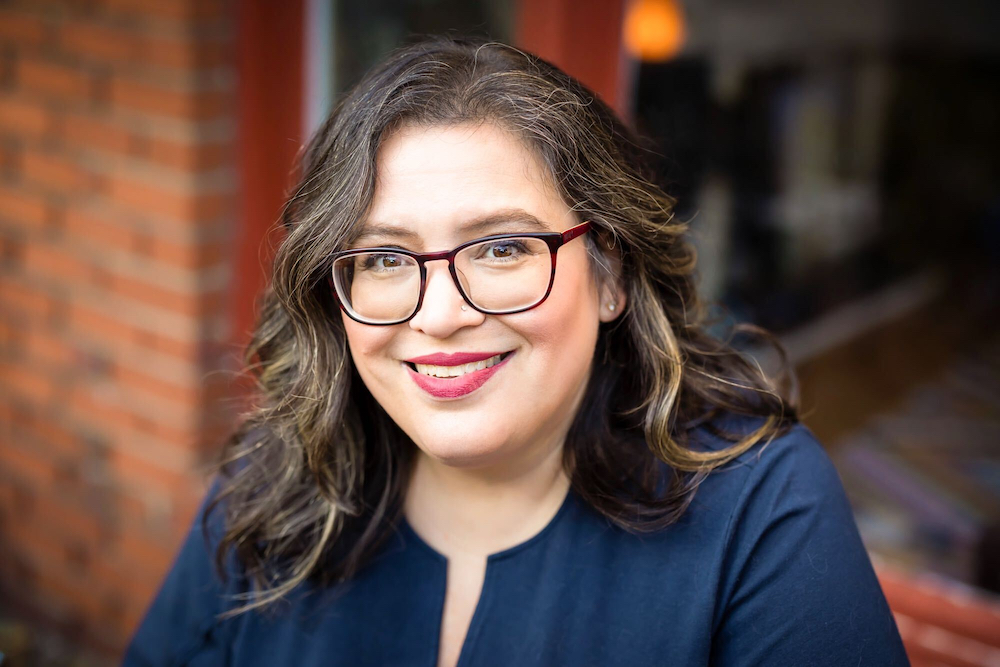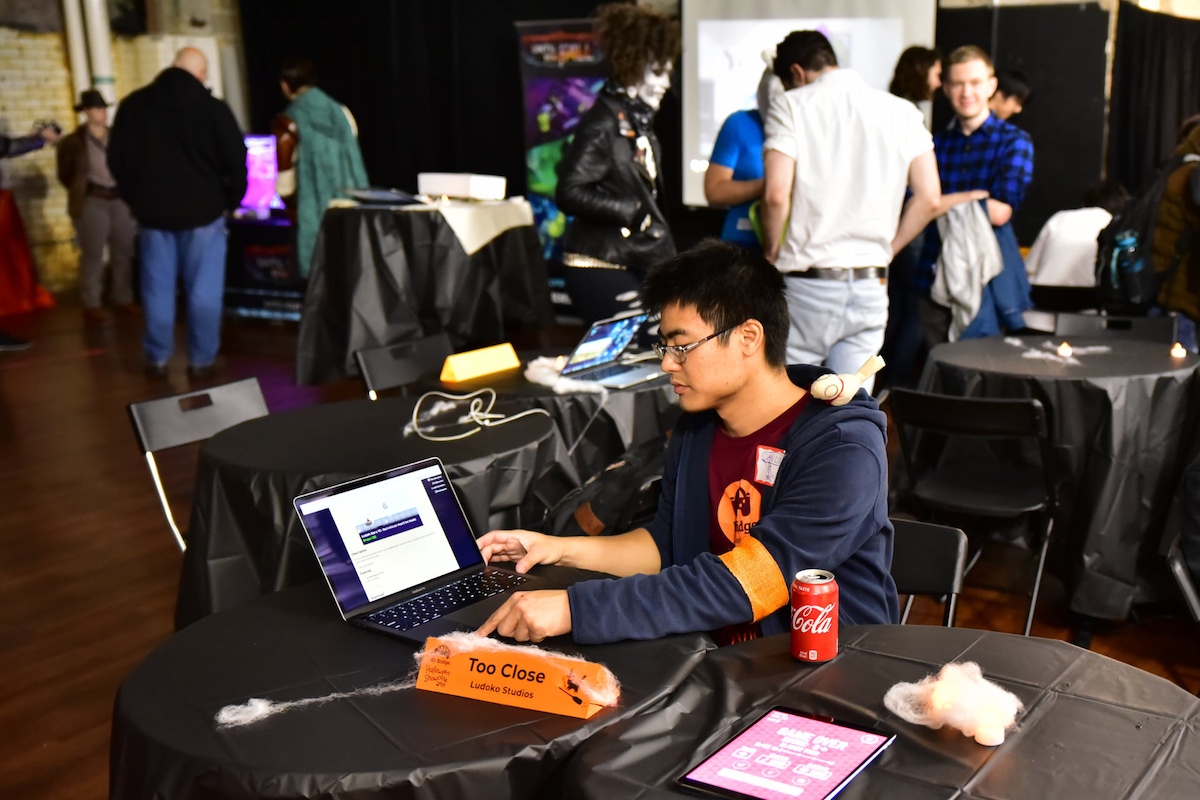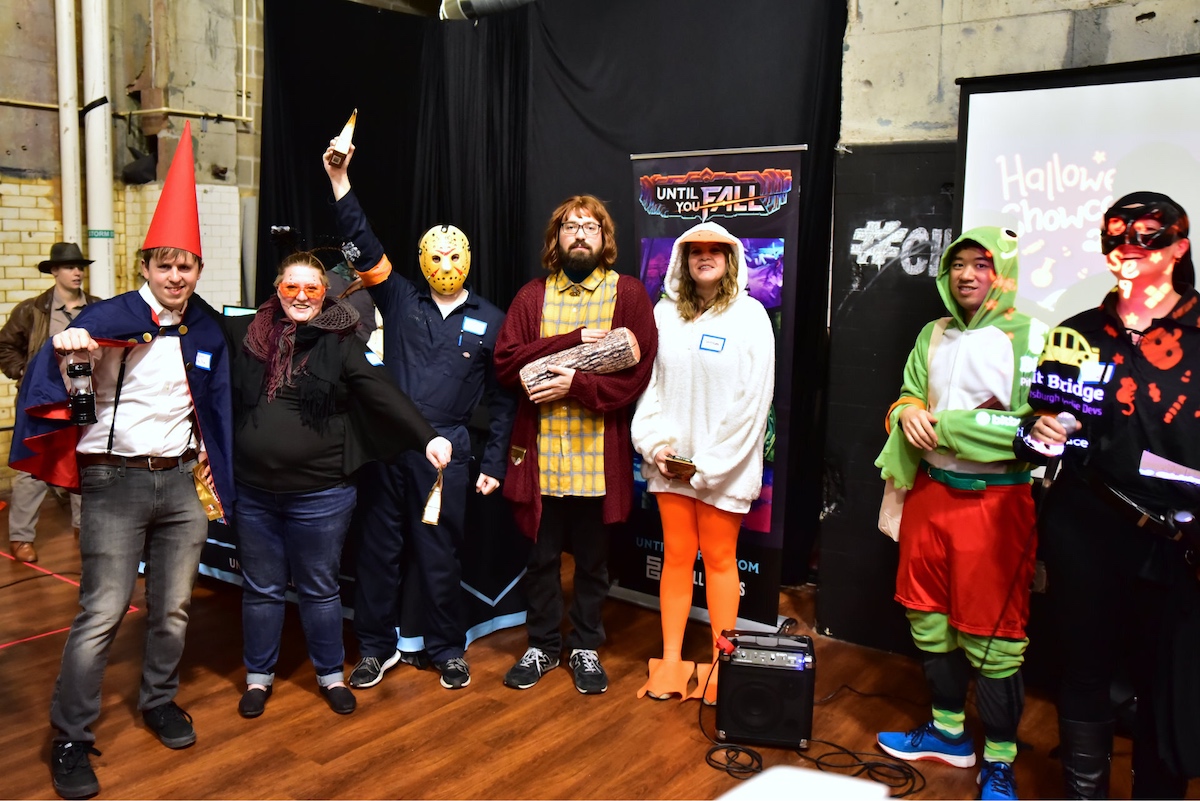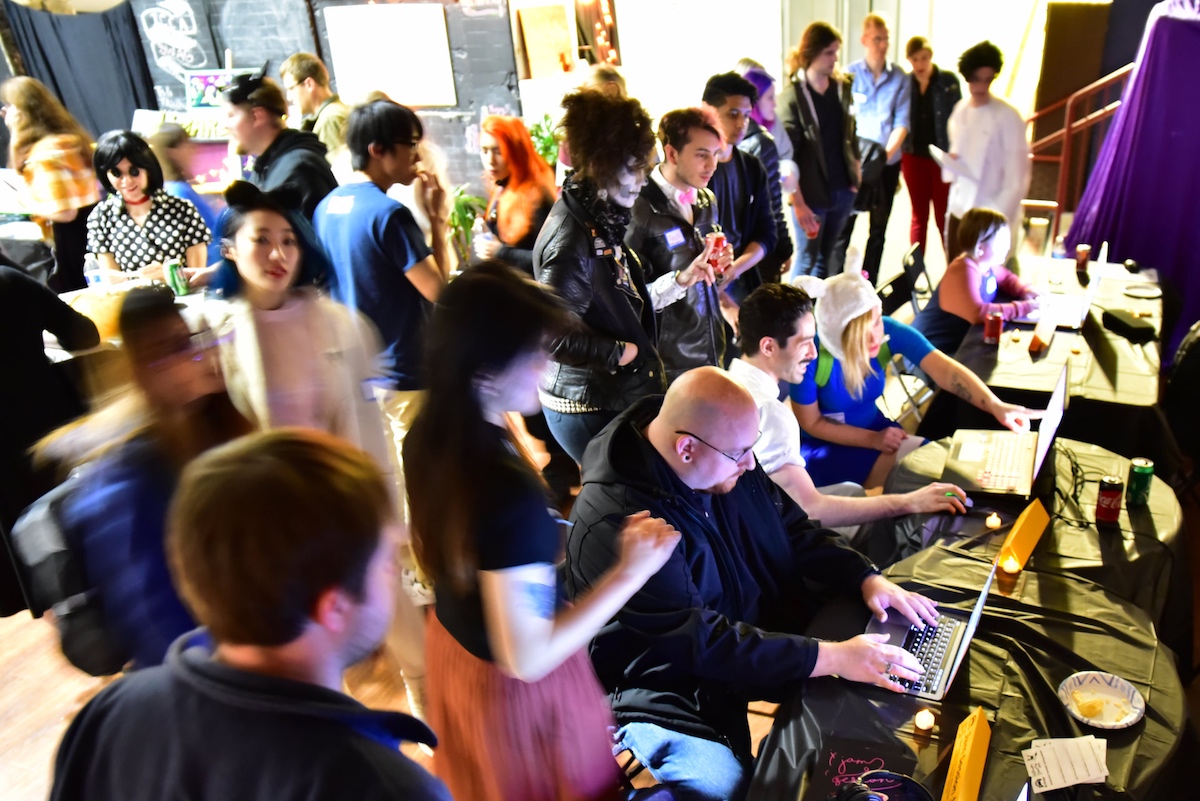Gamers and non-gamers alike are familiar with names like Nintendo, Microsoft and Sony — the tech companies that brought the world well-loved creations such as Minecraft, Animal Crossing and The Last of Us. But those companies aren’t the only places where video games can be made. Indie game groups can provide a haven for game developers outside of these household names, in Pittsburgh and beyond.
After all, for all its acclaim, Nintendo was unlikely to sign off on, say, a now-beloved game that’s just skiing to the tune of “Kiss from a Rose.” (That credit goes to Skeal … like “Seal” and “ski,” we assume.)
Before Jessica Hammer was the director of Carnegie Mellon University’s Center for Transformational Play, she worked for indie game companies such as NYC’s Gamelab and participated in her share of indie groups. As she told Technical.ly, the draw of the indie gaming community is that it offers more freedom for creative projects that a company might not deem worthy of investment. Plus, the life of a game designer can get lonely, Hammer said, so indie gaming groups offer a haven to interact with other individuals who are passionate about gaming and game making.
“People weren’t necessarily trying to make money,” Hammer said of her past indie dev work. “They were doing it for passion, but they [are] actually some of the most talented and skilled game designers I’ve ever worked with.”
Recalling the groups she participated in prior to and even during her pursuit of a doctorate, Hammer said even if the game developed was never played beyond the group, it was worth it to some people to just work on a creative project. (Fun fact: One of Hammer’s former indie colleagues developed a game called Drunken Monkey Knife Fight.) In the same way an artist might join a drawing club but not seek to open a studio, or a pianist might only be content playing in their own home, Hammer explained, some people only preferred to explore their interests in a setting without the pressure of deadlines.
“There’s absolutely a mix of people with different motivations in indie game developer groups, that some people actively don’t want to make it professional because the pressures of doing something for your job are different,” Hammer said.

Center for Transformational Play Director Jessica Hammer. (Photo courtesy of Carnegie Mellon University)
That’s the case for South Side Slopes’ Austin Bowen, the organizer of PGH Game Makers, who explained that he’s had a lifelong passion for video games but he doesn’t feel the need to make it his full-time job. (Right now, that’s being a technician at a materials science lab.) The local group of indie developers he oversees sometimes includes as many as 600 members.
“It’s like anything else — you want to be a musician, or an artist or a writer, especially if you’re a generalist and are interested in a lot of those things,” Bowen said, “it’s a way to explore your skills or passions or forms of expression. You want to pull them together.”
Through PGH Game Makers, indie game developers at various levels of experience come together — sometimes virtually and sometimes IRL in Dormont — to collaborate, share their projects or simply game together. As it’s a largely informal group, Bowen explained that participants can come for all sorts of reasons, such as wanting to explore a hobby, or learning the skills needed to transition into the world of video game development professionally.
“We really want to build a community and a big part of that experience is doing game development, around other people who do game development,” Bowen said. “You find a lot of people that [are] working alone and it can be kind of a solitary activity, so we really want to provide a space for people to connect with other people.”

At a past Bit Bridge event. (Photo courtesy of Dan Lin)
Although many people come seeking a sense of connection, another draw of indie gaming groups is that they allow them the opportunity to experiment in ways that a gaming company might not approve of.
Both Marlena Abraham and Dan Lin work in the gaming industry, as a game designer and senior artist respectively. For roughly a decade, they’ve been the organizers of Bit Bridge Indie Community, another indie gaming group that sometimes meets in East Liberty. When you’re working within a group such as Bit Bridge, Abraham said, the typical constraints such as a budget or a supervisor’s approval won’t stop you from pursuing a project you’re really passionate about.
If you’re like, ‘I just want to make this cool little small thing,’ you can get the ball rolling by yourself or with one or two friends and then turn it into something bigger.Marlena Abraham Bit Bridge Indie Community
“With anything else that’s a big project, you have to have buy in, you have to have resources, have to have money. And a lot of time, if you’re like, ‘I just want to make this cool little small thing,’ you can get the ball rolling by yourself or with one or two friends and then turn it into something bigger,” Abraham said. “In some cases, you can make it into a side business.”
Lin thinks what groups such as theirs offers is structure within the dabbling. You might not want to become a professional game designer and you might not be able to attend a meeting every week, he said, but if you want to work on a long-term project, you’ll have a source of feedback and sometimes collaboration.
“We’re providing a structure for people who are interested in their own projects to come together and talk about things and show things off and get advice from more experienced developers,” Lin said. “So it’s more of a community group than an art collective.”

At a past Bit Bridge event. (Photo courtesy of Dan Lin)
Abraham added that since Pittsburgh is a small city, there’s sometimes overlap between the indie groups. As others have noted, the common denominator in indie game development is that by nature, it can be isolating. But having other people to work with — or sometimes just game with — maintains the joy in the process.
“You’re working on your computer, a lot of times by yourself, a lot of times on a desktop at home,” Abraham said. “Finding people who are excited about talking about indie development can keep the energy alive.”
Ultimately, whether it’s a hobby or an outlet for creation outside a larger game development company, people seek out indie gaming groups for connection, networking, and fun.
“The hope is that it gives people access to other people who are in the space and access to resources for keeping the engine moving and potentially finding teammates or finding a way to get a foothold in the industry,” Abraham said, “if that’s what you’re interested in.”
Atiya Irvin-Mitchell is a 2022-2024 corps member for Report for America, an initiative of The Groundtruth Project that pairs young journalists with local newsrooms. This position is supported by the Heinz Endowments.
This editorial article is a part of Big Tech + You Month 2023 in Technical.ly’s editorial calendar.
Before you go...
Please consider supporting Technical.ly to keep our independent journalism strong. Unlike most business-focused media outlets, we don’t have a paywall. Instead, we count on your personal and organizational support.
3 ways to support our work:- Contribute to the Journalism Fund. Charitable giving ensures our information remains free and accessible for residents to discover workforce programs and entrepreneurship pathways. This includes philanthropic grants and individual tax-deductible donations from readers like you.
- Use our Preferred Partners. Our directory of vetted providers offers high-quality recommendations for services our readers need, and each referral supports our journalism.
- Use our services. If you need entrepreneurs and tech leaders to buy your services, are seeking technologists to hire or want more professionals to know about your ecosystem, Technical.ly has the biggest and most engaged audience in the mid-Atlantic. We help companies tell their stories and answer big questions to meet and serve our community.
Join our growing Slack community
Join 5,000 tech professionals and entrepreneurs in our community Slack today!

The person charged in the UnitedHealthcare CEO shooting had a ton of tech connections

From rejection to innovation: How I built a tool to beat AI hiring algorithms at their own game

Where are the country’s most vibrant tech and startup communities?



